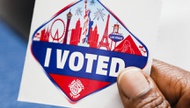The Nevada Legislature will kick off its latest session February 6 in Carson City, with lawmakers and Nevada’s new governor set to develop, weigh and pass new legislation to address the state’s top issues.
Republican Gov. Joe Lombardo will work with a Democratic majority Senate helmed by returning Majority Leader Nicole Cannizzaro, and a Democratic supermajority in the Assembly led by Speaker Elect Steve Yeager.
Lawmakers will walk in with a hefty state general fund budget of $11 billion for the next two years, as Nevada’s economy continues to rebound from the pandemic.
Here are five areas to watch as the 120-day session unfolds.
1. Affordable Housing
Following Clark County’s announcement that its pandemic-era emergency rent assistance program would end in January, Legal Aid Center of Southern Nevada has outlined legislative priorities to mitigate the “eviction crisis” that has been mounting since the pandemic began.
Advocates have called on lawmakers to reform Nevada’s summary eviction process, which requires renters to respond and file with the court after receiving eviction notices from their landlords. Legal Aid Center is also calling for the notice period for no-cause evictions to be lengthened, and for AB486, which prevents eviction while a tenant has a pending application for rental assistance, to be extended beyond its current expiration date in June.
Related to ongoing efforts to reduce the gap between existing inventory and the 80,000 affordable housing units required to meet demand from Nevada’s extremely low-income renters, the Assembly Committee on Revenue has introduced AB62 to expand tax exemptions for low-income housing projects.
On behalf of the Clark Regional Behavioral Policy Health Board, the Senate Committee on Revenue and Economic Development has sponsored SB68, which would increase the real property transfer tax by 20 cents for every $500, and create a “Critical Needs Fund” to provide “certain assistance for very low income housing, supportive housing and supportive services,” according to the legislative digest.
2. Education
In his State of the State address on January 23, Lombardo called his proposed education budget the “single largest investment in K-12 education” in state history. It includes $2 billion to increase per-pupil funding by 2025 in Nevada—a bottom-ranking state for education funding—and $50 million for school choice through Opportunity Scholarships.
For higher education, the governor carved out $75 million pre-funding for scholarships for Nevada students pursuing higher education in the state, and $30 million for scholarships and stipends to train student teachers and help with the state’s shortage of educators.
On behalf of the Clark County School District, the Senate Education Committee has introduced SB47, which would create a Public Education Employee Working Conditions Task Force to establish recommendations for working conditions and to increase the effectiveness and accessibility of public education career pathways. The bill also would expand the authority of school boards of trustees to “build, purchase or rent certain buildings” for residential dwellings for employees.
3. Elections
In his State of the State address, Lombardo repeated his intent to add ID requirements and eliminate universal mail balloting and ballot harvesting, calling the pandemic-era measures to expand voting access “expensive” and “unnecessary.” In response, new Secretary of State Cisco Aguilar, a Democrat, defended universal mail balloting, saying that the system has been proven to work “across party and partisan lines.”
Other potential election changes: The Senate Committee on Legislative Operations and Elections has proposed SB60 to extend the deadline for mail ballot counting from seven to nine days following the election, and SB75, which proposes making the Clark and Washoe County registrar of voters an elected office instead of an appointed position.
Democratic Sen. Skip Daly has said he will introduce legislation that would make it a felony to submit false electoral certificates, for which some Nevada Republicans are under federal investigation related to the 2020 election cycle.
4. Abortion
Cannizzaro has said she plans to introduce legislation that would protect abortion providers in Nevada, along with out-of-state patients. Essentially, the bill would codify an executive order that former Gov. Steve Sisolak issued days after the Supreme Court overturned Roe v. Wade in June 2022.
On the 2022 campaign trail, Lombardo told a Reno TV station that he “absolutely” would repeal Sisolak’s executive order if elected governor. He later walked the statement back and posted on his campaign website, “I have made a commitment not to repeal that executive order until the Legislature can make clear that Nevada is not going to prosecute women who seek an abortion or medical providers that provide legal abortions.”
After Lombardo’s election victory, the Nevada attorney general’s office reaffirmed that it would “not help states prosecute those coming to Nevada to seek reproductive health care legal under Nevada law.”
State law protects abortions up to 24 weeks.
5. Mental Health
According to a new report from nonprofit group Mental Health America, Nevada ranked 29th for overall mental health (youth and adults), based on prevalence of issues and access to care in 2022. That’s up from 51st, the state’s ranking for several years prior.
Last year, the state made significant investments in behavioral health. The Legislature’s Interim Finance Committee approved American Rescue Plan Act funds of $171 million for public health and $45 million for children’s mental health programs. Officials have said that communities can expect to see benefits this year.
In addition to expanding and increasing access to mental health care and services, lawmakers are looking to shore up the state’s shortage of behavioral health professionals.
According to a 2022 presentation from the state Department of Health and Human Services, Nevada had 10.3 Clinical Professional Counselors for every 100,000 people—well below the national average of 45.4 per 100,000. The state falls below the national average for psychologists, psychiatrists and licensed clinical social workers, too.
Introduced by the Committee on Education on behalf of the Washoe Regional Behavioral Health Policy Board, AB69 proposes expanding the University of Nevada School of Medicine’s loan repayment program to behavioral health providers who practice full time in Nevada for at least two years, “to encourage practitioners of certain health care professions to practice in areas of Nevada in which a shortage of that type of practitioner exists.”
In addition to providing assistance for low-incoming housing, the aforementioned SB68 would also require regional behavioral health policy boards—including Clark County’s—to determine funding for supportive housing and supportive services for behavioral health needs.
Click HERE to subscribe for free to the Weekly Fix, the digital edition of Las Vegas Weekly! Stay up to date with the latest on Las Vegas concerts, shows, restaurants, bars and more, sent directly to your inbox!




